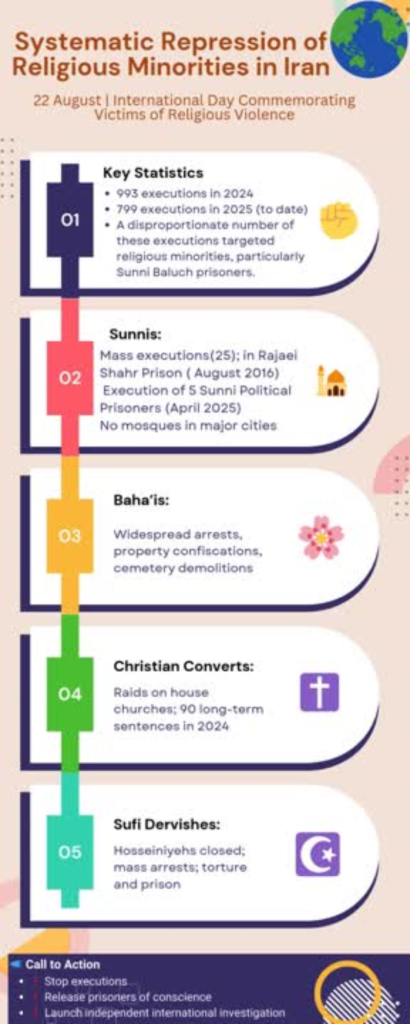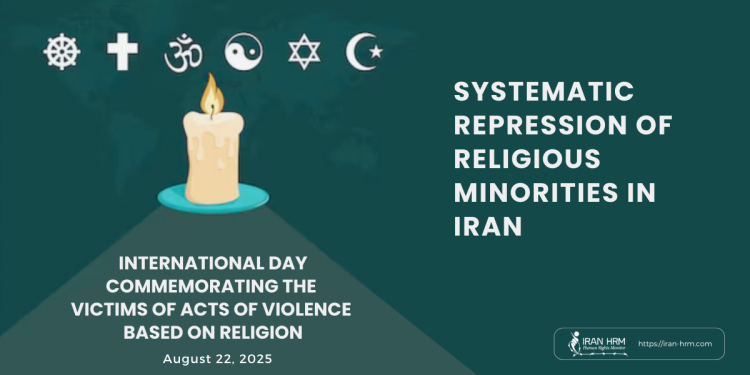Introduction
On 22 August, the International Day Commemorating the Victims of Violence Based on Religion or Belief, the world recalls one of the most fundamental human rights: freedom of religion and belief. This right, enshrined in the Universal Declaration of Human Rights and the International Covenant on Civil and Political Rights, is systematically violated in Iran under the rule of the clerical regime.
Followers of different faiths and beliefs have long been subjected to widespread arrests, torture, mass executions, the destruction of religious sites, and continuous social and economic pressures. This report, issued on the occasion of the International Day, provides a documented picture of the systematic repression of religious minorities in Iran.
Legal Framework and Restrictions
- The Iranian Constitution officially recognizes only three religions (Zoroastrianism, Christianity, and Judaism). Sunni Muslims are mentioned under Article 12, yet in practice they remain among the primary victims of arrests and executions.
- Other religious minorities; including Baha’is, Yarsanis, Sufi dervishes, and Mandaeans; have no legal recognition and are effectively stripped of civil and social rights.
- Through this discriminatory legal framework, the regime consistently violates its international obligations under the International Covenant on Civil and Political Rights, the Universal Declaration of Human Rights, and the Convention against Torture.
Patterns of Repression and Statistics
- Executions: In 2024, at least 993 executions were carried out in Iran; in 2025, the figure has already reached 799.
- A disproportionate number of these executions targeted religious minorities, particularly Sunni Baluch prisoners.
- Arrests: In 2024 alone, more than 1,200 Baha’is were arrested or prosecuted. The number of imprisoned Christian converts increased sixfold, with more than 90 receiving lengthy prison sentences.
 Situation of Religious Groups
Situation of Religious Groups
Sunni Muslims
Sunni Muslims in Iran—particularly in Baluchistan and Kurdistan—are among the primary victims of systematic repression. They are denied the right to build mosques in major cities, prayer halls have been shut down, and Sunni clerics and community leaders have frequently been arrested, many of them sentenced to death or executed. Sunni citizens living in Tehran have been prohibited from having their own mosque both under the Shah and the current regime.
- Mass Executions in Rajaei Shahr Prison – August 2016:
In August 2016, at least 25 Sunni prisoners were executed in Rajaei Shahr Prison in Karaj, without prior notice to their families. Many had been held in solitary confinement for years and tortured during interrogations. This mass execution remains one of the largest cases of religiously motivated executions in recent decades. - Execution of 5 Sunni Political Prisoners – April 2025:
On 8 April 2025, five Sunni political prisoners; Malek Fadaei-Nasab, Taj Mohammad Khormali, Farhad Shakeri, Abdolrahman Gorgij, and Abdolhakim Azim Gorgij; were executed in Vakilabad Prison in Mashhad.
Arrested in 2015, their death sentences were repeatedly overturned by the Supreme Court due to insufficient evidence. However, under pressure from the Ministry of Intelligence and following forced confessions extracted through torture, they were retried, sentenced to death, and executed. Reports indicate the use of pepper spray, blows to sensitive parts of the body, and flogging to obtain coerced confessions. - Baluch Sunnis:
In Sistan and Baluchistan, dozens of Baluch prisoners are executed every year. In 2024 alone, more than 100 Baluch prisoners were executed, including Shuaib Mir-Baluchzehi Rigi, an 18-year-old.
Baha’is
The Baha’i community, the largest non-recognized religious minority in Iran, has long been the target of systematic elimination.
- Educational and employment bans: Baha’is are barred from universities and government jobs.
- Confiscation and destruction of property: Homes, shops, and farmlands have been seized or demolished, their confiscated properties are transferred to the ‘Setad (Execution of Imam Khomeini’s Order)’, meaning they come under Khamenei’s ownership.
- Widespread arrests: In 2024 alone, more than 1,200 Baha’is were arrested or prosecuted.
- In some cases, heavy sentences and even death penalties have been issued against Baha’is, underscoring the regime’s hostile stance towards their faith.
Christian Converts
Christian converts, particularly those worshipping in house churches, face constant persecution.
- Security forces regularly raid house churches and arrest participants.
- In 2024, more than 90 Christian converts received long prison sentences.
- Many have been forced to leave the country due to systematic harassment, denial of education, and restrictions on employment.
Sufi Dervishes
The Gonabadi Sufis and other Sufi orders have faced long-standing repression.
- Religious centers (Hosseiniyehs) in cities like Qom and Isfahan have been sealed or demolished.
- Hundreds were arrested during the protests of 2017–2018.
- Many have been tortured, beaten, and sentenced to long prison terms.
- While no specific executions of dervishes have been recorded in recent years, the community remains under relentless structural repression.
Yarsanis (Ahl-e Haq)
The Yarsan community, also known as Ahl-e Haq, has no recognition in Iranian law and lives under severe discrimination.
- They are barred from higher education and government positions.
- Many are forced to conceal their religious identity to avoid persecution.
- Execution of Reza Rasaei – 2025: Reza Rasaei, a follower of the Yarsan faith from Kurdistan, was executed in 2025 on charges of “enmity against God.” His family and supporters stated that the charges were fabricated and that his real “crime” was his Yarsani faith.
Mandaeans
The Mandaeans (Sabian Mandaeans) are a very small community in Khuzestan.
- Their religion is not recognized by the Constitution.
- Religious rituals are heavily restricted.
- Cemeteries have been repeatedly vandalized.
- Many have been forced to migrate abroad.
Recognized Minorities (Christians, Jews, Zoroastrians)
Although officially recognized in the Constitution, these minorities still face discrimination.
- Discrimination exists in inheritance laws, legal testimony, and blood money (diya).
- Their schools and religious institutions are under heavy state surveillance.
- Sunni Muslims, despite formal recognition, remain the most persecuted group, particularly through executions and arbitrary arrests.
International Condemnations
- Mai Sato (current UN Special Rapporteur on the situation of human rights in Iran): She has highlighted that religious minorities; including Baha’is, Sufi dervishes, Christians, and Sunnis; remain victims of structural discrimination and arbitrary detention. She has called on the regime to end these practices.
- Professor Javaid Rehman (former UN Special Rapporteur on human rights in Iran): In his reports, he repeatedly described the repression of freedom of religion and belief in Iran as systematic human rights violations. He specifically highlighted the plight of Baha’is, Christian converts, Sufis, and Sunnis as examples of religious persecution, urging the international community to pursue accountability.
- Amnesty International: The organization has identified Iran as responsible for the highest number of recorded executions worldwide, disproportionately targeting Baluch and other religious minorities. It has also documented mass arrests and the demolition of Baha’i homes.
Conclusion and Call to Action
This report demonstrates that the persecution of religious and belief minorities in Iran is not an isolated occurrence but a systematic state policy. Through executions, arbitrary arrests, denial of civil rights, and structural discrimination, the clerical regime seeks to erase these communities from public life.
We call on:
- the United Nations Human Rights Council,
- the UN Special Rapporteur on the situation of human rights in Iran (Mai Sato),
- the UN Special Rapporteur on freedom of religion or belief,
- and other international human rights bodies,
to:
- launch urgent and independent investigations into violations of religious freedom in Iran,
- impose a moratorium on executions,
- secure the release of prisoners of conscience,
- and guarantee religious and civil freedoms for all citizens of Iran.







